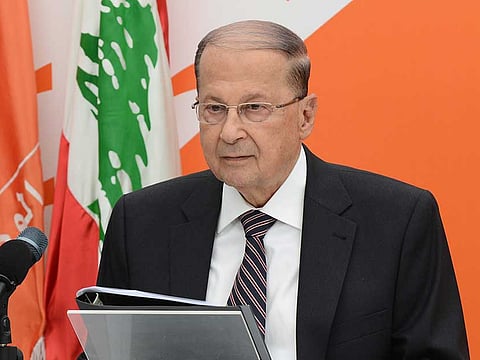Lebanon strives to make a difference
The country is making an efort to hold its own in a volatile region, even as challenges proliferate

In the aftermath of another failure to ensure multilateralism, the situation in Lebanon appears unbelievably positive: No threatening demands from neighbours, no civil war, no major terrorist attacks in the streets of Beirut. Which country, where the population has gone up by a third following the inflow of refugees from Syria and Iraq, would have faced such a situation with no blip?
The election of a new President, Michel Aoun, conveyed with it the hope that long-standing issues would finally start getting sorted out. The chronic lack of state control — and the corruption that goes with it — would be counter-weighed by a revamped willingness to put reforms forward: A necessary reorganisation of state spending, drafting of a new electoral law, and the many things that do not go around in the country. A strong president accepted by all parties; a robust banking system, allowing the local currency to remain stable; and a buoyant real estate market: The three pillars that form the basis of a brighter future.
Alas, all is not that hunky dory.
The institutional and banking systems, precisely, are two examples illustrating the rule according to which “everything should change so that nothing changes”. The new electoral law passed last June was supposed to allow for legislative elections to take place in May 2018 — just eight years since the previous one! But it is likely that the “historical event” will bring little change in the situation that remains tightly controlled by existing political forces. The reshuffling of constituencies will not deeply modify a confessional approach of a political life that has been dying a slow death for the last 50 years.
Looking at the Christians’ side, the ongoing alliance between the Lebanese Forces (FL) of Samir Geagea and the Free Patriotic Move (CPL) of Aoun serves little purpose of strengthening of the Maronite components. The president’s man, Gibran Bassil, promoted to the Head of CPL, is just another example of what happens when family cronyism takes priority over vision. His recent declarations, similar to the 30-year-old ‘secessionist’ writings of United States-based Lebanese writer Walid Phares (an adviser to US President Donald Trump for the Middle East), are all but comforting for the peaceful future of the country.
At a time when the future of Aoun itself is being questioned, wouldn’t a trans-confessional widening of the political base of the Christians — as suggested by Northern Marada leader Sleiman Frangie — been more appropriate? Do these tricky games address the threats that the fight against terrorism should normally entail?
As for the banking system — and more generally the Lebanese economy — “a much-flaunted resilience has become part of the problem, allowing for all sorts of anomalies to stack up, relentlessly bringing the system close to a breaking point” (‘Abracada ... broke, Lebanon’s banking on magic’, by Rosalie Berthier — Snap, May 2, 2017).
The Lebanese economy has defied conventional analysis for years. It’s “resilience” and the “genius” of Banque du Liban (BdL) governor Riad Salame, “coupled with monetising Syrian refugees, an offshore oil-and-gas boom, the ripple effects of Syrian reconstruction and, in the end, an international conference to bail out the country”, were supposed to balance an apparent stable currency with artificial high interest rates on the Lebanese pound, a sovereign debt valued at 144 per cent of gross domestic product, with virtually no exports or significant foreign direct investments, an over-priced real estate sector and slowing of business across the board.
The Lebanese state is currently spending one-third of its revenues on interest paid to local banks and another third in salaries and pensions. Needless to say that it has to borrow from local commercial banks (they own 85 per cent of the debt), which must have a growing recourse to outside depositors — namely, the Lebanese diaspora. What would happen should that move start shrinking, as it precisely did last year? It is when the BdL came into the market with an apparently sophisticated mechanism, the so-called “swap”. The results of that, in a perfect sleight of hands, resulted in huge profits for banks, enabling them to reward their clients with 20 per cent one-off interest on their deposits in dollars — and covering the net balance against risky investments in real estate in places such as Syria and Turkey.
The booming of guns is therefore not the only threat to put the future of the region at stake. Lebanon has proved that it has other ammunitions for it.
Luc Debieuvre is a French essayist and a lecturer at IRIS (Institut de Relations Internationales et Strategiques) and the ‘FACO’ Law University of Paris.

